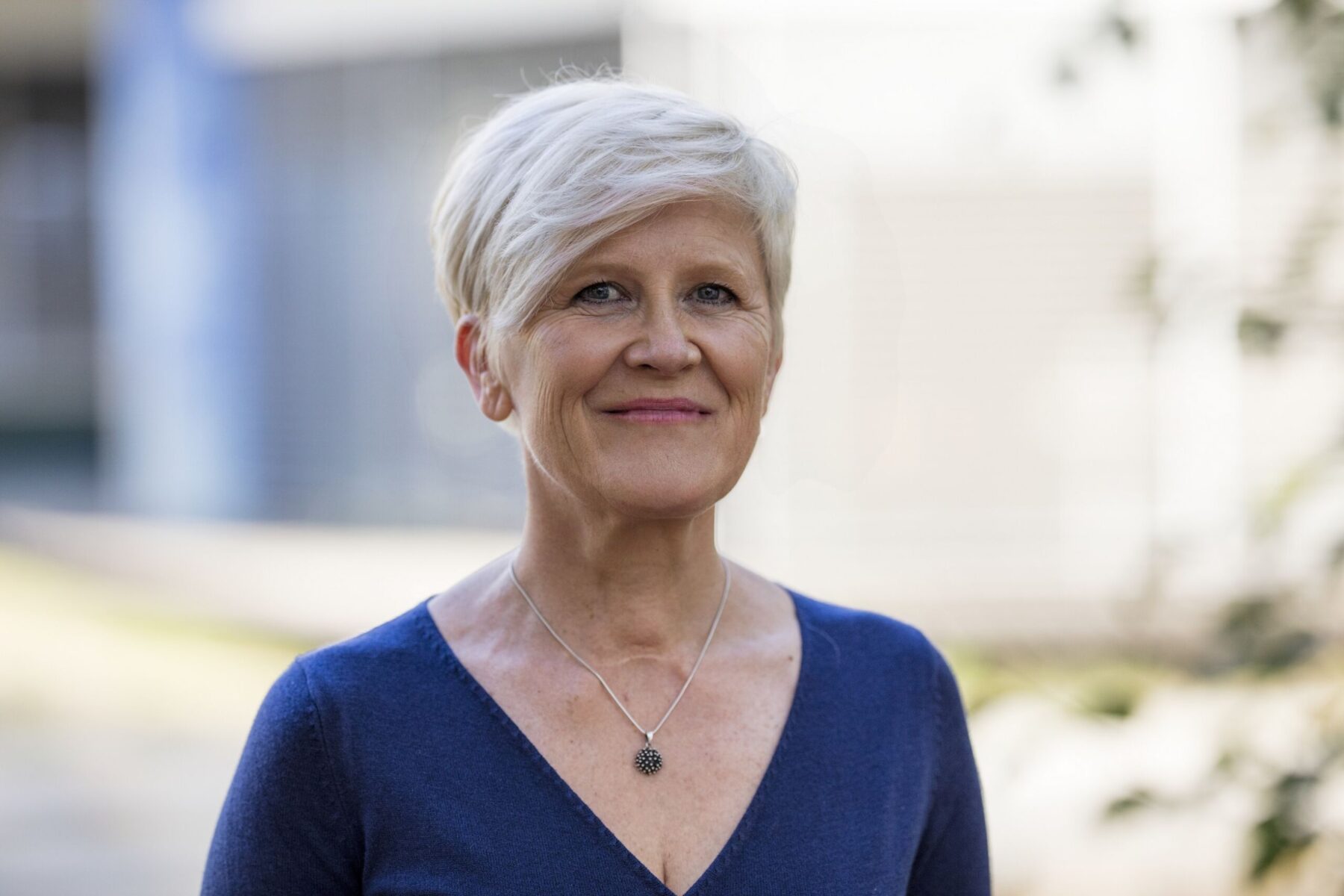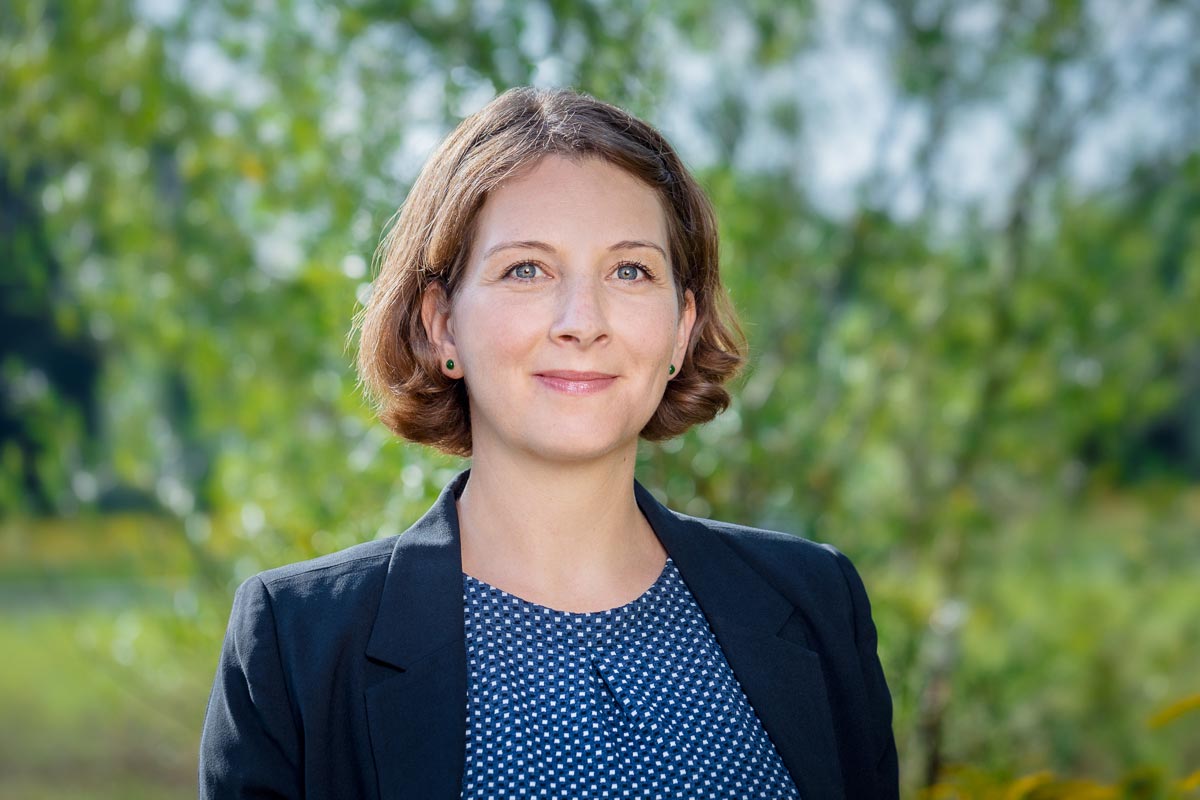
Language School at the Potsdam Science Park – Passion for Learning, in an Intimate Setting
People from around the world work side by side in the Potsdam Science Park. Since 2010 the Park’s own Language School has been available for when they want to learn some German or English. Small class sizes and superb personal support make it an enticing option.
Vsevolod logs on to Zoom at 11:30am sharp. He’s wearing a burgundy polo shirt and a poster on the wall shows the orbits of a planet. Russian-born Vsevolod usually works on gamma-ray bursts in space at the Max Planck Institute for Gravitational Physics (Albert Einstein Institute), but today he’s learning German vocabulary and grammatical nuances like the imperative form of the verb aufstehen (get up!). Course teacher Kay Wishöth asks him what his weekend was like. Vsevolod tries explaining in German that he went on a bike ride in Potsdam and likes playing the piano and learning languages. With classmates Evgeny (from Russia) and Félix-Louis and Claire (both from France) he’s been learning German at the Potsdam Science Park’s Language School. Common to all of them is a desire to use the language to get to know more people and communicate better – and possibly sort the odd thing out with landlords who can only speak German.
Language School at the Potsdam Science Park: low class sizes, high motivation
The Potsdam Science Park has had its own Language School since 2010. Apart from “German as a Foreign Language” it also offers English courses. The School’s head, Carolin Schneider, notes equal levels of demand for both. There are currently 30 courses running simultaneously (as of May 2022) and course offerings are tailored not just to beginners but also advanced learners. Competence levels are checked with a written and oral test done after learners finish their online registration. The School is intended to serve everyone working at the Potsdam Science Park, and fees are covered by the entity (research institute / lab) the learner works at. One selling-point is the small class sizes: they are generally made up of six learners. Each of the grades, which run from A1 to C2, involves four course modules. A course runs for a total of nine weeks, during each of which four 45-minute-long lessons are scheduled. Having her class sizes this small means a lot to English instructor Jin Choi: “You can tailor the lessons a lot more. If there’s a topic the class members are interested in, we can work it into the lesson.”
German for non-native learners: what international scientists stand to gain
One of the Language School’s eight instructors is Arnim Sürder who teaches “German as a Foreign Language” (GFL). Now 64, Sürder graduated in German Studies and History before working at a textbook publisher. At 40 he opted for a change of career and trained at Berlin’s Humboldt University as a GFL instructor. His subsequent GFL trajectory ended up bringing him to the Potsdam Science Park where he has been teaching since 2018. He finds the job fulfilling: “I get to work with nice people who are very grateful for what we can teach them. It’s a great feeling.” He teaches both online and face-to-face. His classes include people at very different points in their careers: “it ranges from people doing PhDs at research institutes to postdocs and even Principal Investigators who have their own Scientific Working Groups.” There are plenty from elsewhere in Europe, notably Italy and Spain, “but you also get people from Russia, China, the US or Turkey joining. Our language courses are a kind of microcosm of the Potsdam Science Park’s diversity, where you have people of about 73 nationalities working together,” Sürder concludes.
Learning German to get by
There are many different things that motivate people to sign up for a German language course. For people in the sciences the predominant working language is overwhelmingly English, as even Sürder admits: “scientists at the research institutes mostly talk to each other in English, even with their German colleagues. They don’t have to read journals in German either, science is too international for that.” “When people round here choose to learn German,” School head Carolin Schneider adds, “it’s mostly for social reasons. Networking, but maybe also reaching out beyond your own work circles and finding new impetus”. Besides that, it’s also a matter of being comfortable in your new environment: “when someone is going to be here for several years, it’s generally worth their while to understand some German. It helps with various little day-to-day things too, making a hairdresser’s appointment on the phone, say, or restaurant reservations or raising issues with building management where you live. English does take you a long way, but when you’re doing everyday stuff it’s mostly easier in German,” Schneider adds.
English courses for people working with international teams
The picture is a very different one when it comes to the English courses which the Language School also lays on. Most people taking these are from Germany and want to improve their language levels. “Lots of people in these classes were born when East Germany still existed, and were taught Russian at school instead. They didn’t pick up much English,” explains Jin Choi, who teaches the beginner’s grade A1 up to the intermediate B2. Choi herself hails from Baltimore, Maryland where she helped children and teenagers from low-income backgrounds improve their language skills. She has been pouring her heart and soul into teaching English here in Potsdam Science Park since 2018. “I love being a language learner too – I find it fascinating. And I want my enthusiasm to rub off on others.” Many of her students work in admin, but find themselves interacting with scientists from all over the world who’ve moved to Potsdam. “So it makes sense to be able to communicate with them,” concludes the US-born Choi, whose students come to class to improve and expand their command of the language with a view to having better interactions at a place as cosmopolitan as Potsdam Science Park.
Coronavirus and its impact on language lessons
When the coronavirus pandemic broke out in early 2020, the Park Management team had to make changes to the way the Language School did things. From its previous fully in-person approach, the School had to switch over to a digital model so as to prevent transmission of the virus. “Making the switch was a real challenge,” admits Carolin Schneider, “since we had to turn all our classes into webinars in the space of a week.” After quite a few technical teething problems at first, the digital class model ended up working well, however. “There were lots of positive sides to it for me. The lessons we ended up being able to offer online were as good as in-person classes. And many of us learned a few tech tricks as well, particularly some of the older students,” recalls Jin Choi. German instructor Arnim Sürder sees it in a positive light too: “I was surprised how stable it was with the class members dialling in online,” to which he adds that scientists have been able to keep up their attendance despite being at conferences abroad, for example. Nevertheless many learners were looking forward to in-person teaching again when it gradually resumed.
The Language School as a place of learning and socializing
The Language School’s range of courses plays a key role in keeping the fast-growing science and business hub that is Potsdam Science Park a genuinely international place. Carolin Schneider finds one more thing significant: “the Language School is not just a place of learning but also one of meeting and interaction. Networking, restaurant meetups and friendships can all happen. These kinds of closer contacts are very handy when it comes to language learning.” This is the idea behind the Language School’s explicit mission: “as a Language School we want to be true to a cosmopolitan vision, and work towards building better networks within the community, so that you have people learning from each other and gaining from the process. People are generally professionally focused on very specialist, very advanced topics, but they don’t get to hear about what’s happening in the other labs, institutes and facilities next door to where they are. They need to know what else is going on out there. To have that social fabric you need language and interaction.” And that’s why she’s always happy when class members end up meeting for dinner and practicing one of the languages together: “we’ve seen cases where someone with no German at all ends up being able to talk fluently on the phone just two years later.” She gleefully adds: “and yes, we have had people emerge as couples from our language courses, and there’s been the odd marriage too.”
Dieser Blog und die Projekte der Standortmanagement Golm GmbH im Potsdam Science Park werden aus Mitteln des Europäischen Fonds für regionale Entwicklung (EFRE) und des Landes Brandenburg finanziert. Bildnachweis: Carolin Schneider, Standortmanagement Golm GmbH © Standortmanagement Golm GmbH, Martin Jehnichen
Contact

Julia Hinz
Site marketing
julia.hinz@potsdam-sciencepark.de + 49 331 237 351 109